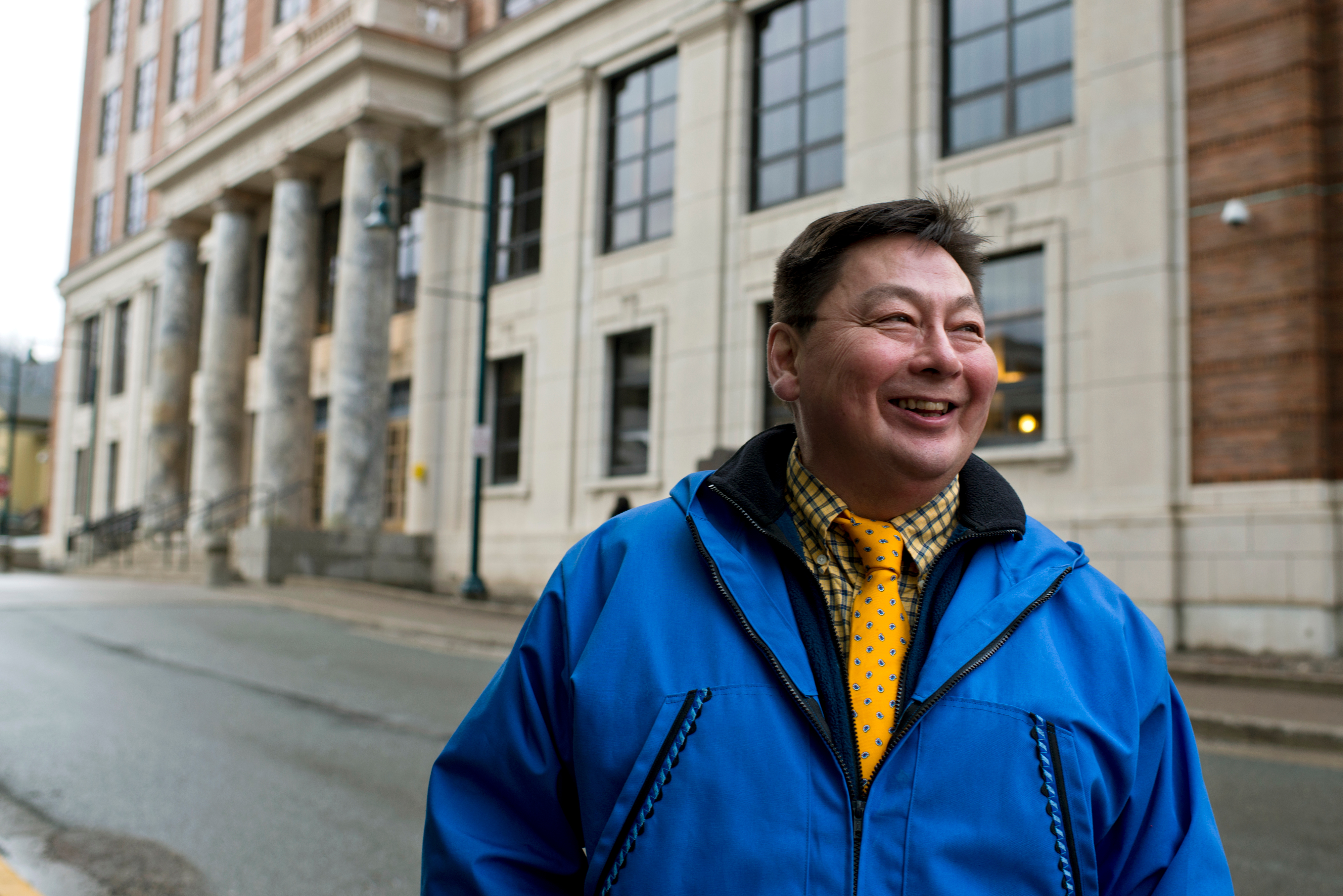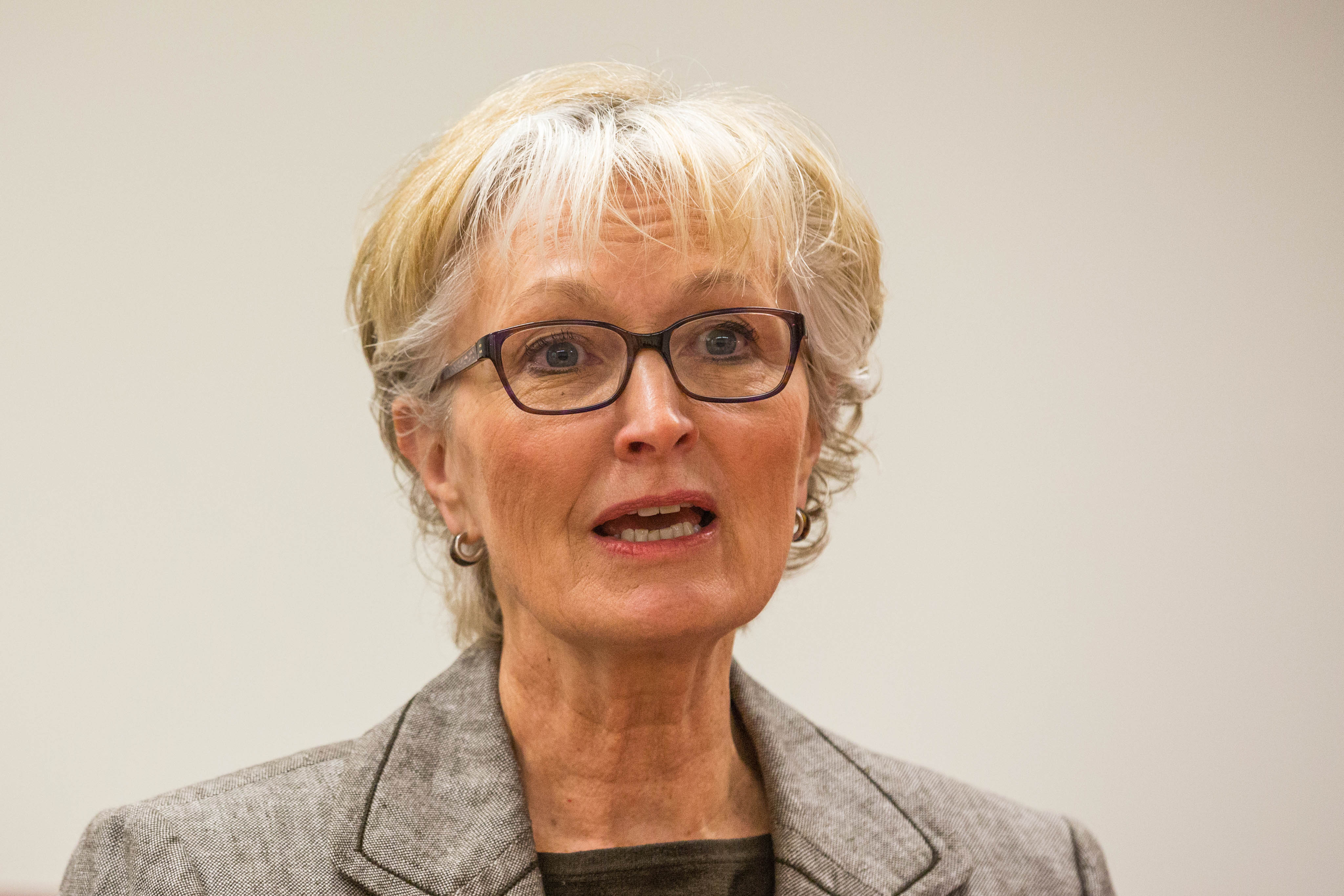With Trump administration intentions unclear, Alaskans might have to fill the void on Arctic policy

For the rapidly warming Arctic, where people may be anxious about climate change, Secretary of State Rex Tillerson last week had some soothing words.
The Arctic Council, the eight-nation group that the United States chaired until May 11, “has proven to be an indispensable forum in which we can pursue cooperation,” Tillerson said in remarks at the organization’s ministerial meeting in Fairbanks just over a week ago. “I want to affirm that the United States will continue to be an active member in this council. The opportunity to chair the council has only strengthened our commitment to continuing its work in the future.”
The actions of President Donald Trump — who has called climate change a hoax and who has invoked an isolationist “America First” motto — and his administration demonstrate less enthusiasm about the priorities of the Arctic Council and one of its key concerns, accelerated Arctic climate change.
Two years after President Barack Obama made a three-day trip to Alaska, where he called climate change “no longer some far-off problem,” something that is “changing the way Alaskans live” and a daunting challenge that deserves immediate action, the Trump administration has proposed to ax all federal climate science and sharply cut or eliminate funding for programs, like the Denali Commission, that address Arctic climate change.
At the State Department, whose website now only obliquely mentions climate change, no replacement has been named for Robert Papp, the State Department’s former special representative to the Arctic, and none is expected. Papp, a former U.S. Coast Guard commandant who took the Arctic post in 2014, resigned in January.
Trump, in an executive order, scrapped a new Obama-era initiative by Alaska Native villagers that aimed to protect the Bering Sea marine environment and help local people cope with rapid climate warming there.
The 2015 Paris climate agreement, which other Arctic governments consider critical to protecting the northern regions, is under attack within the Trump administration. Scott Pruitt, director of the Environmental Protection Agency, recently told Fox News the Paris agreement “puts America last.”
In his commencement speech Wednesday at the Coast Guard Academy, Trump called for more U.S. icebreakers — just as Alaskans have done — but he was unclear on funding sources; his administration has proposed deep budget cuts for overall Coast Guard operations.
Obama-to-Trump political whiplash aside, it is natural that national attention to the Arctic would diminish somewhat after the two-year U.S. chairmanship, some experts say.
Several years of intense U.S. government Arctic focus started even before the chairmanship, with Royal Dutch Shell and its unsuccessful offshore Arctic exploration program, said Nils Andreassen, executive director of the Anchorage-based Institute of the North.
After that stretch of activity, “we should expect to see some kind of normalization of U.S. attention to the Arctic,” Andreassen said.
A federal pullback could put more responsibility for U.S. Arctic policy in the hands of state and local people.
For Andreassen, who helped form an Alaska host committee that organized and coordinated Arctic Council and council-related activities in the state, that means some new and yet-to-be determined duties. The host committee intends to continue education and outreach work, but the scope is not yet clear, Andreassen said. The committee is consulting with the governor and lieutenant governor on future plans, he said.
Local governments might take on some new international Arctic roles. A declaration by several mayors from cities in Alaska, Canada, Norway, Finland and Iceland pledged future exchanges of information, technology and best practices — and cites “a climate that is changing at twice the rate of other regions of the world” as an urgent and common challenge.
“By signing this declaration, we commit to strengthening the bonds between our people and communities to build a resilient region capable of improving living and economic conditions, ensuring that the benefits that come with the promise of the Arctic accrue to the peoples of the Arctic,” says the document, signed March 12 in Fairbanks.
On the state level, the Alaska Legislature — which has been involved with international Arctic issues for several years — has found a new cause in promoting safety of ships sailing through the Bering Strait to the Arctic. A resolution passed on Tuesday by the state House urges the state and federal governments to enact some binding agreements to better regulate increased vessel traffic in that region.
An important goal, said Rep. Dean Westlake of Northwest Alaska, is to have all ships traveling the narrow Bering Strait and nearby region use locator devices. Only some ships use those devices now, leaving Alaskans partly in the dark about vessel movements there, said Westlake, the measure’s lead sponsor.
“What I’d like to see is everybody on the same page — on the same frequency, literally,” he said.

More broadly, Westlake, who is Inupiaq, said he wishes for a change in Trump’s climate-change position. Among other things, Westlake said, he would tell Trump that protecting the Arctic environment helps allow Alaskans to continue to harvest their traditional foods and promotes food security.
“We don’t want food stamps. They never taste as good as caribou,” he said.
Carter Price, a new high school graduate from Unalaska, would also like to get that message to the president.
“I would let him know that there are real lives that are endangered in the Arctic. It’s real. It’s not some hoax. It’s not fake. You can see it happen,” said Price, an Aleut from Unalaska and one of 22 Alaskans in an Arctic Youth Ambassador program launched by the U.S. government at the start of the U.S. chairmanship.
The Arctic Youth Ambassador program, managed by the U.S. Fish and Wildlife Service, will continue for at least another two years with a new group of young Alaskans even though future State Department participation is uncertain. That is thanks to support from several other partners, including nonprofits, said Sara Boario of the U.S. Fish and Wildlife Service.
Nongovernmental organizations and foundations could give a boost to other Arctic programs in the state, Andreassen said. With the state government in an oil-related fiscal crisis that challenges future projects, NGOs and even other governments like the European Union, Canada and the Nordic nations might wind up as partners helping Alaskans mitigate and adapt to climate change, he said.
There are opportunities for “a lot of leveraged relationships,” he said. “Even if it’s not the U.S. doing research, I think the EU is going to fill the space with some of its interest.”
Former Alaska Lt. Gov. Fran Ulmer, who chairs the U.S. Arctic Research Commission but is no longer a State Department adviser now that the U.S. Arctic Council chairmanship is over, sees some mixed signs.
On the bright side, the Arctic Executive Steering Committee, established by Obama in 2015 to coordinate an Arctic strategy, remains operational, Ulmer said.

But she worries about budget cuts at the state and federal levels. In particular, pending cuts to the University of Alaska system, well-known for its Arctic research, are “very painful,” and shortsighted, said Ulmer, a former university chancellor.
“When you are driving your car at night do you turn off your headlights? In the Arctic where change is happening so fast, we need to use monitoring, observing and research to shine the light on how we need to adapt to these changing conditions … not turn off our headlights and drive blind,” she said in an email.
Sen. Lisa Murkowski, meanwhile, said she sees signs — based on Tillerson’s words — that the administration will not reduce the federal government’s Arctic engagement.
She is even hopeful that the president, who famously called the idea of global warming a hoax invented by the Chinese to harm U.S. manufacturing, will take a new approach to that issue.
“The president has said what he has said,” Murkowski told reporters in Fairbanks the day after the May 11 ministerial meeting. Still, the declaration signed at the end of the meeting, “a document that was negotiated with the United States holding the pen,” seems to signal revamped policy because it contains strong language on Arctic climate change and the need for emissions controls, she said.
“I’m hoping that through the benefit of good constructive dialogue just as we have seen here in Fairbanks, he will look at this and say, ‘I misspoke,’” Murkowski said.